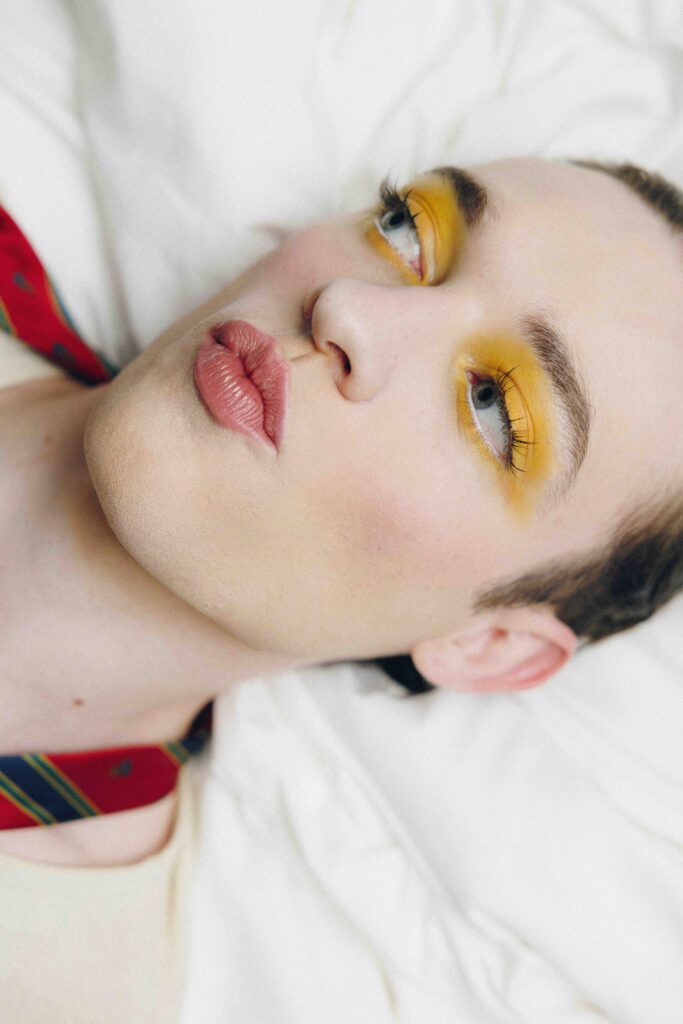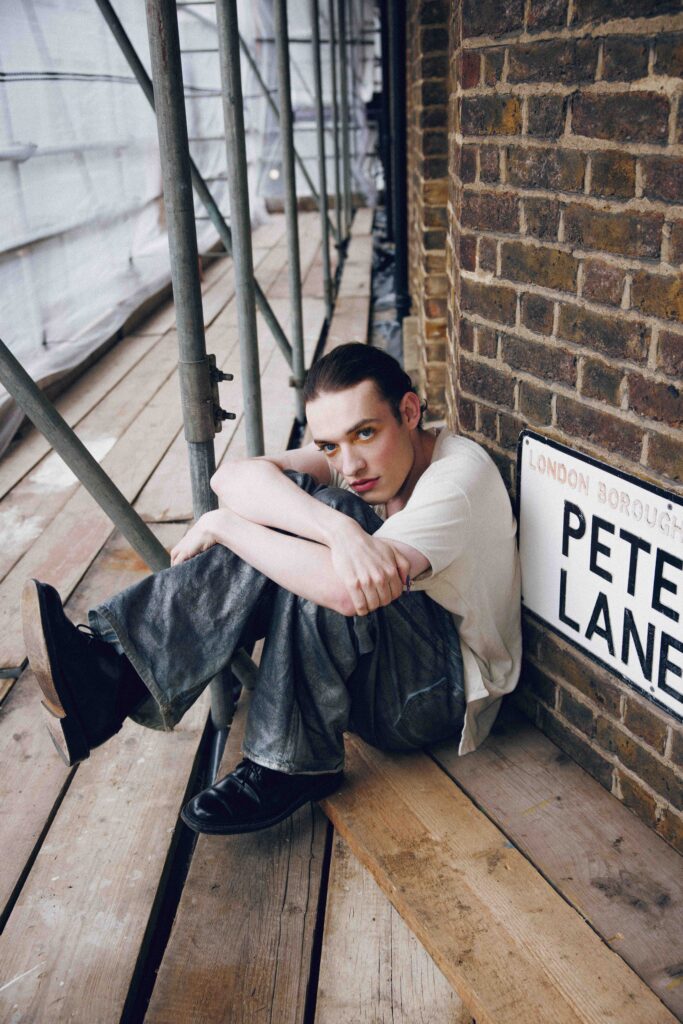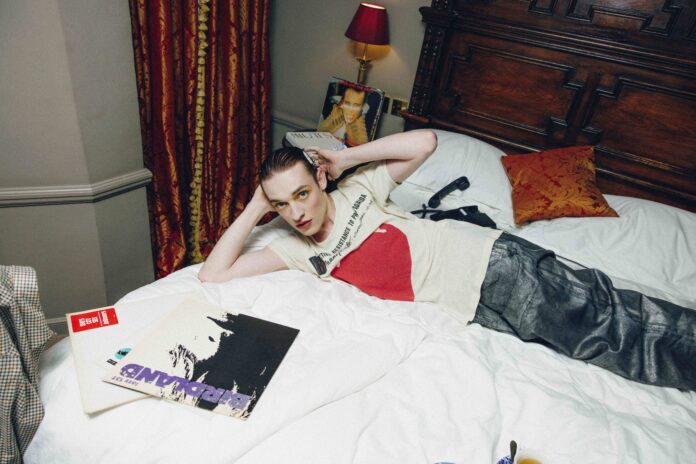When Eurovision Song Contest 2024, the high-camp international singing competition, crowned Nemo as its winner last year, it signified more than a musical triumph — it was a groundbreaking moment for representation. Since then, the nonbinary artist, celebrated for their theatrical performances and unapologetic authenticity, has become a powerful symbol of LGBTQ+ visibility.
Switzerland’s winning entry, “The Code,” co-written by Nemo, marked the country’s first victory since “Ne partez pas sans moi” by Celine Dion in 1988. It also made history as the first winning song by a nonbinary artist in the contest’s history. Imagine an opera-rave fusion, as Nemo’s vocals reach beyond the ceiling and tip over into rap. On the chorus, they sing, “I went to hell and back to find myself on track; I broke the code. Like ammonites, I just gave it some time; now I found paradise.” In October, the artist followed up with “Eurostar,” a high-energy club banger.
But Nemo’s impact goes beyond music; they’ve boldly and directly challenged Swiss leadership to recognize a third gender option, advocating for change not just for themselves but for countless others seeking acknowledgment and equality. As we look ahead to 2025, these critical conversations about identity and representation are sure to resonate far beyond Switzerland, sparking dialogue across the globe, including here in the U.S.
On stage and during our video interview, Nemo radiates warmth and a perky spirit — even at 9 a.m., a time they confess is “usually my wake-up time, not my interview time.” From L.A., where they recently attended a dreamy Malibu wedding and were partaking in songwriting sessions, Nemo opened up about what their Eurovision win means — not just for their career, but for so many who find inspiration in their story.
I owe you congratulations, Nemo! How cool is it that you get to represent not just the LGBTQ+ community, but specifically the nonbinary community?
I feel like this is what I really fed off of. During the whole competition, I think my number-one drive was knowing how much visibility matters: getting messages from all over the world — or all over Europe mainly, but also a few from the U.S. — during the process and how it started a conversation in [someone’s] family, or how they finally had the courage to come out or they realized something about themselves during Eurovision. Not just because of me, but because of queer representation this year in general. And it continues to be a huge honor to just get to be myself in public and know that people are watching, and young people are watching — people that need to have representation to look up to, because when I grew up, I didn’t have any nonbinary people in media or wherever to look up to and feel represented by.
It just is such a wonderful time and a special year, and not just with Eurovision. I feel like there’s all these artists that are openly queer and are making amazing music or amazing art and people really feel that, and I feel like it really matters. So knowing that I can be a little part of that has been one of the biggest honors of my life.
People like David Bowie, Annie Lennox and Mika may not be nonbinary, but obviously they all challenged gender norms in some ways. Were you drawn to artists like them, and who are some of the artists you’re proud to stand alongside now?
For me growing up, it was definitely Mika. I think I felt very at home in his music, but also just in his personality in this world he’s built. I’ve always felt drawn to people like that. Also, Freddie Mercury from Queen. I used to listen to a lot of Queen and I never really knew or understood why, but I think I always felt drawn to these types of personalities in music and art.
You can’t really pin it down, but it makes sense in retrospect. And nowadays, people I really look up to right now… I mean, one of the biggest inspirations for me personally is Chappell Roan. She has such a wonderful universe, but also personality and music; she’s such a great connector in the queer music scene, but also just connecting worlds and opening up the field to so many more people. I think there are always super important people in the course of history, people that can really build bridges in a way. I feel really inspired by her a lot at the moment.
You mention both Mika and Chappell Roan creating artistic universes. Take me back to when you were young and musical and doing that for yourself.
I think in a lot of ways I was always drawn to worlds that weren’t the world I was living in. I was always drawn to theater and opera, and I was in youth opera when I was from nine to 13 or so, and we prepared one opera a year. I love to just dive into certain worlds. As a kid, I felt very drawn to that. One of the biggest fascinations was actually “The Magic Flute” by Mozart, and I was obsessed with the “Queen of the Night” [aria].
And now you are the queen of the night.
Literally. That’s the coolest part about “The Code” — a part of the “Queen of the Night” made it into “The Code.” And I feel like it’s the realest thing, because I used to annoy everyone around me singing this song the whole day. I can hit the high notes. I never thought about it that way, but I was always fascinated and drawn into alternate universes. That’s also why I ended up making music, because I think that was when I realized this is the place I can literally create whatever I want to. And I think that’s still what drives me with making music. Nowadays, it’s building worlds and building universes.
I love that. I think your victory sends a powerful message, especially considering Switzerland’s rejection of a third gender option. How do you feel your win impacts this perspective on representation in your country?
I think there’s been a few things that have happened. The first thing that happened was it just took this conversation to a much broader level in my country. The story was suddenly so big that people that didn’t want to talk about it couldn’t ignore it anymore. That was certainly something that it did and continues to do now that Eurovision is going to be in Switzerland again. I think when it happens, there’s going to definitely be the question of, so how much has actually changed in this year? How have things progressed? Did they progress at all?
It happened a few months before the Eurovision finale, when I was already announced as the artist to go to Eurovision. I was getting ready for an interview and I was in this makeup chair at the television [station], and then suddenly I see the Swiss president, one of the Swiss presidents coming in, and he’s getting ready for his interview, as well, and getting his makeup done. We get our makeup done in very different ways. On me, there’s a little bit of powder.

No nails?
No nails. But we started talking and it was really cute. And then, he left. He asked for a picture and left. That night I was like, oh, wait, maybe I should talk to him about the third gender entry option on Swiss passports and IDs.
And I just sent him an Instagram message like, “Hey, would you want to maybe get some coffee and talk about this?” And then I get an Instagram message back: “The Swiss president doesn’t answer Instagram, but we can certainly make a meeting happen.” It was one of his assistants, but then things got really crazy with Eurovision and fast-forward, I’m at the press conference. They asked me, “What’s the first thing you’re going to do when you get back to Switzerland?” I was like, “Well, I’m probably going to meet the Swiss president for coffee to talk to him about the third gender option on passports.”
And obviously, I wasn’t exactly aware of how much impact just that one sentence would have, because I wasn’t aware that this moment had become so huge. But that became a national headline. Actually, I met him a month later with the lovely people of the Transgender Network Switzerland, and we talked about various options and things, but not just the third gender entry on passports, but also just safety and visibility for nonbinary people in general, trans people in Switzerland, and it was a really good conversation.
And we just actually texted again for an update in the next couple of months because I really want to know what actually has changed. Switzerland is obviously like a slow democratic country in the way that everything is direct. We have direct democracy, so things tend to take time because every decision can be challenged in a way. People can propose their own laws. If you get 100,000 signatures, you can propose a law and then the nation decides if this law is worth putting in place or not, but also you can challenge it. Overall, as I said, how can we increase security and visibility and build bridges? And I think that’s equally as important for nonbinary and trans people in Switzerland. So I’m excited to meet Mr. [Beat] Jans again and talk to him.
You’re touring Europe next year. Can we expect to see you in the U.S.?
I would love to. I would love to come to the U.S. I think a good way to start for me in the U.S. would be to do a support tour somewhere with someone. I think that’d be a great way to get to know the country musically and get to know what touring feels like here, but definitely next year I’ll play in the U.S. in some way.
Your shows must just be like an operatic rave.
Actually, I think that’s a great image. It’s just me singing “Queen of the Night,” 90 minutes straight.
What’s the timeline for your full debut album?
It’s in the works. I booked a lot of studio time in January and February, so that’s when I want to finish the album and round it all off. But at the same time, I don’t want to have the pressure of saying it has to be absolutely done. But then I really want to make something that I’m super happy and excited about. And I think just good music takes time and I’m working on making my album the best thing I can possibly create. And so I want to be very gentle with that part of myself and just make sure I’m really happy with the result before committing to a release schedule. But definitely sometime next year.
I imagine it’s a lot of pressure. The debut is a defining moment. It initially defines your sound and who you are.
Definitely. I feel like an album is such a nice way to capture a moment in time of your life and it feels like this very extensive journal entry.


